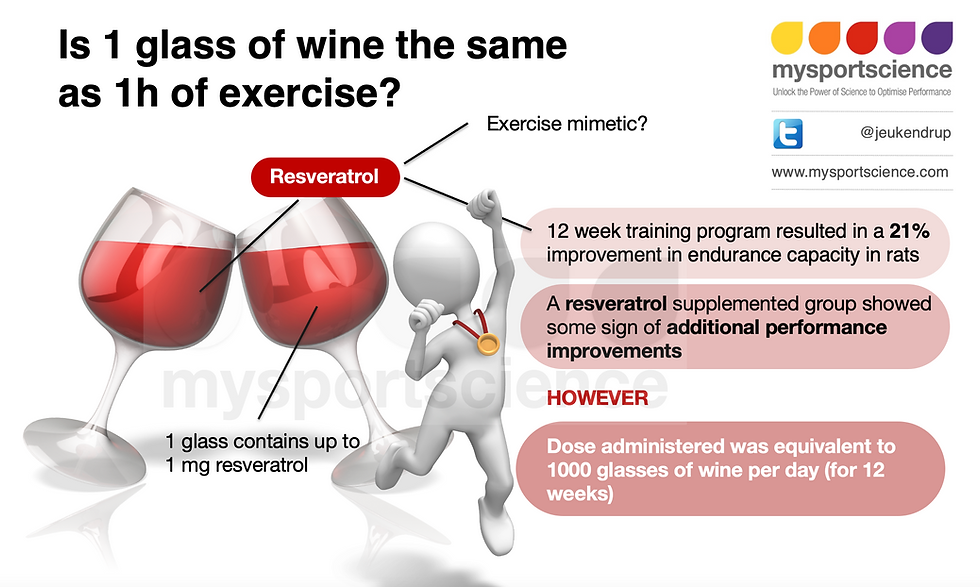What is better? A glass of wine or an hour of exercise?
- Asker Jeukendrup
- May 11, 2022
- 3 min read
In a previous blog we discussed a study that suggested that red wine is good for fat burning. Here we will look into the effects of resveratrol, a polyphenol that can be found naturally in many foods, including wine. Resveratrol is sometimes called an exercise mimetic… An exercise mimetic is a substance that is supposed to have similar effects on health and performance than exercise. Does resveratrol really have these effects? And because resveratrol can be found in red wine, could drinking a glass of red wine turn us into an elite athlete?

Resveratrol: A magic supplement?
It is common knowledge that exercise training improves endurance capacity. It does this mostly by triggering an increasing in the number and the size of mitochondria, the energy generators in our cells. Studies have demonstrated that a naturally occurring polyphenol, resveratrol, can also trigger the growth of mitochondria. In 2012, a study investigated whether resveratrol in combination with exercise training could enhance training adaptations in rats (1). There were two groups of rats. One group received a normal diet, the other group received the same diet supplemented with resveratrol. The rats performed a progressive training protocol for 12 weeks which resulted in a 21% improvement in endurance capacity. The researchers measured an increase in force production by the muscle in the rats that were supplemented, and also an increase in cardiovascular function and in fat oxidation by the heart muscle. Before you order your resveratrol supplement or start drinking your glass of red wine, please keep reading because there is a caveat.
Similar to exercise training, a naturally occurring polyphenol, resveratrol, can trigger the growth of mitochondria.
How much resveratrol to see a benefit?
In this study (1), the rats received 4 gram per kilogram of rat food, or roughly 146 milligram per kg bodyweight. If we just did a simple conversion to humans, this would be 10 g for a 70kg person. Even if this direct translation to human body weight is not entirely fair and we would be off by a factor 10, this would still be at least 1 gram (or 1000 milligrams) of resveratrol.
One glass of wine will have around 1 mg of resveratrol (at best)… so in order to get your 1 gram dose of resveratrol you would need 1000 glasses of red wine per day….
And we have done the calculations in a very conservative way here. We do not recommend that you drink this amount of wine all at once! Even if this would work… It would be a substantial investment that is unlikely to end well.
"Even if [consuming large amounts of resveratrol in wine] would work... It would be a substantial investment that is unlikely to end well."
In 2022, a systematic review and meta-analysis was published that compared all studies that looked at resveratrol and training adaptations (2). The authors selected studies that were at least 2 weeks of training with or without polyphenol supplementation. One of the polyphenols they looked at was resveratrol. In general, the authors concluded that there was no significant effect of resveratrol on training adaptation and in fact if anything there was a negative effect.

Exercise for mitochondria, wine for enjoyment
So, I hope I stopped you in time from running to a store to buy resveratrol supplements. I hope I also stopped you from drinking 1000 glasses of wine. I would not want to stop you drinking one glass of red wine. If you decide to drink one glass of wine and thus consume around one milligram of resveratrol, I hope you do it because of the wine and not because of the resveratrol. For many reasons, an hour of exercise a day is a pretty good idea too.
References
Dolinsky VW, Jones KE, Sidhu RS, Haykowsky M, Czubryt MP, Gordon T, Dyck JRB. Improvements in skeletal muscle strength and cardiac function induced by resveratrol during exercise training contribute to enhanced exercise performance in rats. J Physiol 1;590(11):2783-99, 2012
Martinez-Negrin G, Acton JP, Cocksedge SP, Bailey SJ, Tom Clifford T (2022) The effect of dietary (poly)phenols on exercise-induced physiological adaptations: A systematic review and meta-analysis of human intervention trials, Critical Reviews in Food Science and Nutrition, 62:11, 2872-2887, 2022




















